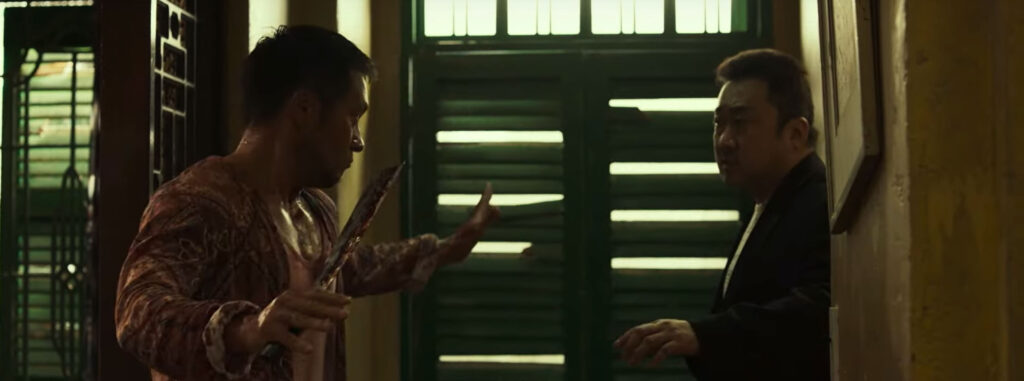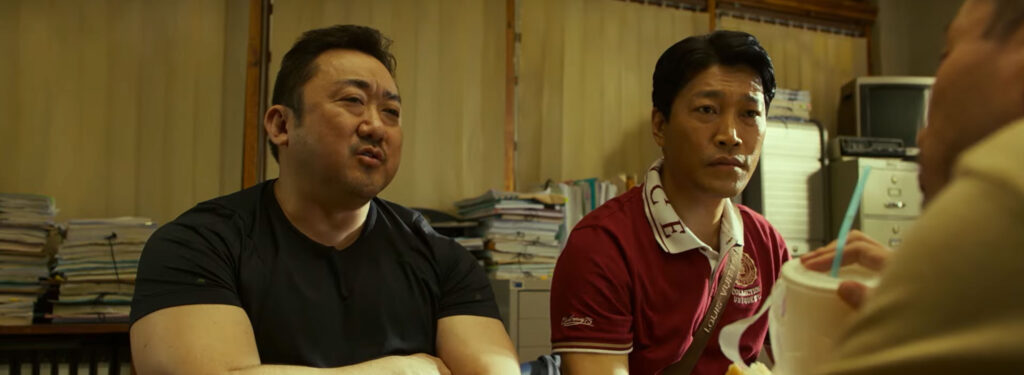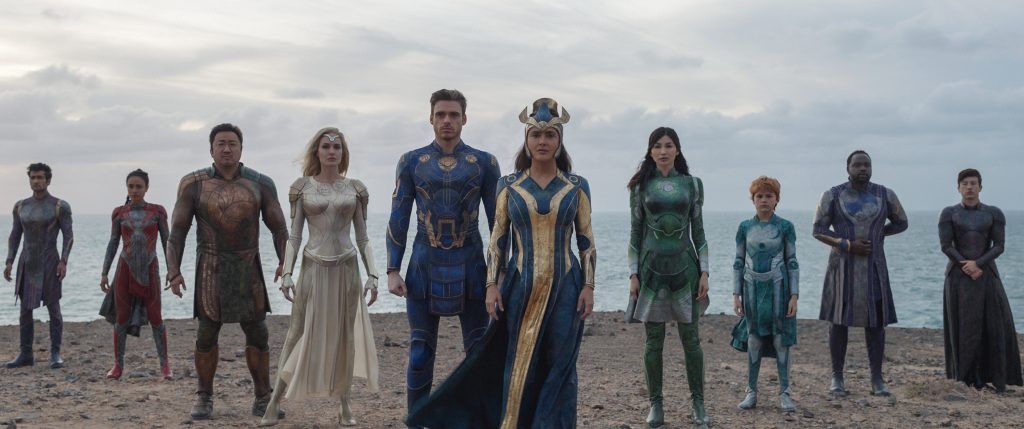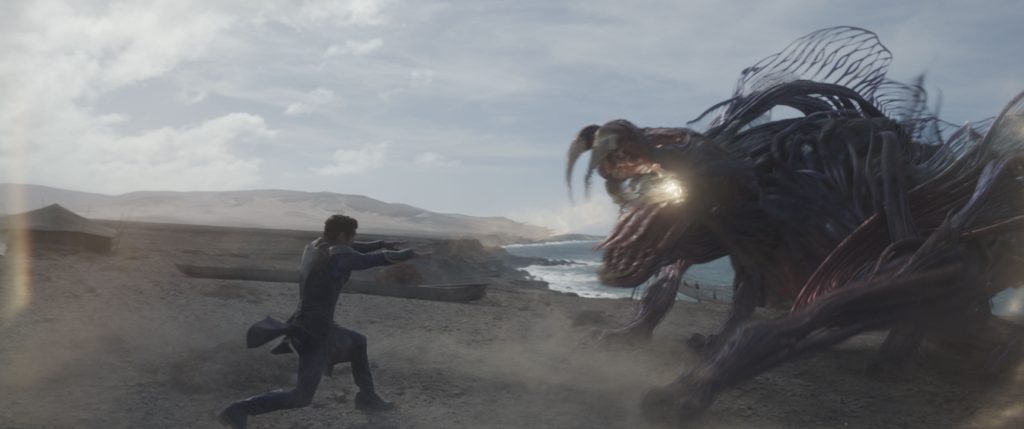June 5, 2022
by Carla Hay

Directed by Lee Sang-yong
Korean and Vietnamese with subtitles
Culture Representation: Taking place in Korea and Vietnam, the action film “The Roundup” features an all-Asian cast of characters representing the working-class, middle-class, wealthy and the criminal underground.
Culture Clash: Roguish police detective Ma Seok-do and his colleagues try to hunt down a ruthless crime boss, who eludes law enforcement in Korea and Vietnam.
Culture Audience: “The Roundup” will appeal primarily to people who are fans of “The Outlaws,” star Don Lee, and suspenseful action flicks about cops versus criminals.

“The Roundup” delivers plenty of thrills and adrenaline-pumped action in this worthy sequel to 2017’s “The Outlaws.” In this “cops versus criminals” story, the flawed protagonist’s misdeeds and mistakes bring some intentional laughs. The last third of the movie includes an epic chase during a kidnapping and ransom drop that will make “The Roundup” a memorable standout among a sea of action films.
Directed by Lee Sang-yong, “The Roundup” (which picks up four years after the events of “The Outlaws”) continues the story of hot-tempered police detective Ma Seok-do (played by Don Lee), who is nicknamed “The Beast” or “Beast Cop,” because he doesn’t hesitate to commit police brutality to get his version of justice. Detective Ma works in the major crimes unit of the Seoul Police Department in South Korea. His antics have given him a reputation as a loose-cannon cop.
An early scene in the movie shows how Detective Ma operates. He’s called to a crime scene at a convenience store, where a deranged man with a knife is having a shouting meltdown and wildly swinging the knife at anyone who comes near him. Detective Ma shows up late because he says he was on “a blind date.”
Detective Ma quickly subdues the attacker with a very illegal beatdown. The movie then cuts to a scene at the police station, where Detective Ma and three colleagues look at an unflattering newspaper article about this incident. The article, which has a photo of Detective Ma at the convenience store, has a headline saying that the Beast Cop has struck again.
The article mentions that Detective Ma was disciplined for excessive use of force, and he was sent to rehab for 12 weeks. Detective Ma scoffs at the report with his three cop colleagues: mild-mannered Oh Dong-gyun (played by Heo Dong-won), eager Kang Hong-seok (played by Ha Joon) and rookie Kim Sang-hoon (played by Jung Jae-kwang). All three of these cops look up to Detective Ma for his fearless and often-irreverent attitude.
One person in the police department who tries (and often fails) to control Detective Ma is his supervisor Captain Jeon (played by Choi Guy-hwa), who frequently admonishes Detective Ma, but begrudgingly admits that Detective Ma is often effective in his work. That’s why Captain Jeon often looks the other way or enables Detective Ma to get away with certain unethical things, if it means that it will help the cops solve a case. When Captain Jeon and Detective Ma do interrogations together, it’s easy to predict who will play the “good cop” role and who will play the “bad cop” role.
Captain Jeon tells Detective Ma that the two of them will be going to Vietnam to investigate why a South Korean criminal named Yoo Jong-hoon (played by Jeon Jin-oh) has turned himself into authorities in Vietnam. Yoo Jong-hoon was a suspect in a high-profile jewelry heist in South Korea, so the two cops want to see what Yoo Jong-hoon has to say and if he can be extradited back to South Korea. There’s some comical back-and-forth between Captain Jeon and Detective Ma about which of them can speak English on this trip.
The interrogation of Yoo Jong-hoon leads to him confessing to being involved in a 2008 kidnapping and murder of a wealthy South Korean business scion in his 20s named Choi Yong-gi (played by Cha Woo-jin) in Ho Chi Minh City. This kidnapping and murder were committed by a gang led by a ruthless overlord named Kang Hae-sang (played by Son Suk-ku, also known as Son Seok-koo), whose charming good looks mask a nasty and sadistic personality. Son’s portrayal of this villain is one of the main reasons to see “The Roundup,” because he convincingly plays the Kang Hae-sang character as both coldly calculating and insanely reckless.
The rest of “The Roundup” involves Detective Ma and his colleagues uncovering more of Kang’s crimes and trying to track him down to arrest him, first in Vietnam and then in South Korea. Kang is an elusive and crafty criminal who always seems to be far ahead of law enforcement. Instead of keeping a low profile when he knows he’s being hunted, he goes out of his way to cause more madness and mayhem. It’s why, as a movie villain, Kang is riveting to watch.
Needless to say, “The Roundup” has a lot of brutal violence that is not for viewers who get easily offended by this type of content. Some of the fight stunts are over-the-top and unrealistic, because these fights would definitely cause more damage in real life than what’s shown in the movie. However, that doesn’t mean that the cops and other people involved in the fights don’t have the physical effects of getting beaten up or shot. “The Roundup” has four people credited as the movie’s screenwriters: director Lee Sang-yong, Ma Dong-seok, Young-jong Lee and Min-Seong Kim.
People don’t watch a movie like “The Roundup” for award-worthy acting. However, the acting in “The Roundup” is better than the average “cops versus criminals” movie. Lee is very charismatic in his role as Detective Ma, the rogue cop who makes wisecracking quips in between some of his questionable and harsh ways of getting what he wants. The actors in supporting roles get their jobs done well, but make no mistake: It’s the Beast Cop’s world, and everyone else is just living in it. The villain Kang Hae-sang is the only supporting character who can be considered truly formidable to Detective Ma.
Just when you think “The Roundup” is going to be a typical international police caper that will wrap up in a certain way, the movie ramps up the suspense with a kidnapping. This abduction involves the parents of murder victim Choi Yong-gi, whose father Choi Chun-baek (played by Nam Mun-cheol) was with him in Vietnam before Choi Yong-gi was abducted and murdered. The Choi spouses are targeted because of their wealth and because of certain things that happened after their son’s death.
One of the Choi spouses gets kidnapped, but this review won’t reveal which spouse. A Detective Ma colleague named Jang Isu (played by Park Ji-hwan) is recruited to help in the kidnapping case. This kidnapping plot development leads to the best parts of the movie, which takes some action-packed twists and turns that will have viewers completely on edge to see what will happen next. It makes “The Roundup” the type of gripping and crowd-pleasing thriller that is sure to inspire more sequels.
Capelight Pictures released “The Roundup” in select U.S. cinemas on May 20, 2022. The movie was released in South Korea on May 18, 2022.


